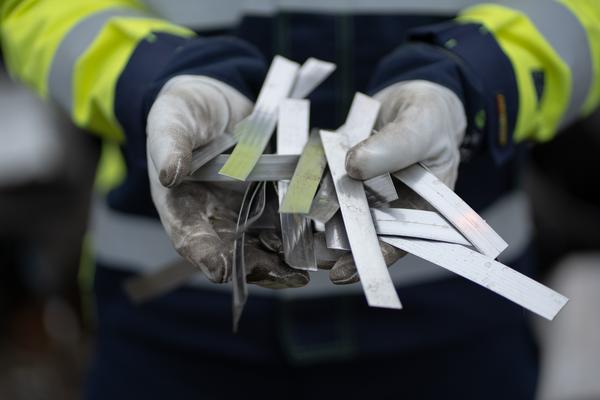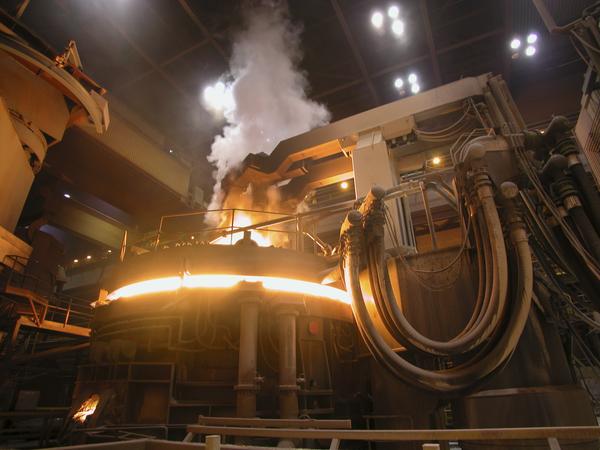As the energy crisis in Europe continues, companies and consumers alike are forced to think of ways to save electricity and improve energy efficiency. Currently, Outokumpu is Finland’s biggest user of electricity, so improving energy efficiency is naturally important to us. In this blog, I will be going over what we as a company have done in order to save energy already before the crisis and what we could still do to make the green transition a reality.
Low-carbon steel from the heart of the circular economy
Outokumpu’s stainless steel enables sustainable solutions that make our daily lives easier. It is used both in the construction of urban infrastructure as well as in everyday items, from knives and kettles to laundry machines. Its durability and long lifecycle are further complemented by the fact that it is 100% reusable.
Outokumpu’s stainless steel also produces the least emissions in the industry. A tonne of steel that we produce has a carbon footprint that is approximately 70 percent smaller than that of average steel globally.
Our production is based on the circular economy – over 90 percent of the raw material we use has been recycled. In our manufacturing process, we use electric arc technology to heat up and melt reused steel in order to minimize emissions. However, this also consumes a lot of electricity. For this reason, energy efficiency and constantly improving it have been a part of our everyday operations for years now.
 The recycled material content in our production is over 90%
The recycled material content in our production is over 90%
Ambitious goals and projects guide development
The energy crisis in Europe has turned our operating environment on its head. In order to control the uncertainties, we decided in November to take immediate action to improve our energy efficiency. We made the decision to prioritize investments that improve energy efficiency and to increase capital expenditure related to improving energy efficiency by a total of EUR 40 million for 2023 and 2024.
By the end of 2024, our goal is to improve energy efficiency throughout the Group by 8 percent compared to the level of January–September 2022. This equals an energy saving of approximately 600,000 MWh, which corresponds to the electricity consumption of 15,000 households.
The first projects have now been approved, and they are expected to start in early 2023. The first millions of euros have already been invested in the projects, and the projects will yield an estimated energy saving of 42 GWh. This corresponds to 7 percent of the total savings goal.
The first approved projects are aimed at, among other things, improving the energy efficiency of industrial furnaces, developing the combustion process and replacing the existing technology with more energy-efficient models. There are also various ongoing projects serving continuous improvement that do not require large investments but can still lead to considerable energy savings.
We would have continued our ambitious work to improve energy efficiency even without an energy crisis in Europe, but the current situation gave us a push to expedite our schedule for reaching our goals. More stringent energy efficiency measures also support our ambitious climate goals: we are committed to science-based emission reduction targets in order to keep global warming below 1.5 degrees Celsius.
Energy efficiency, competitiveness and emissions reduction go hand in hand. With each of our decisions, we aim to move one step closer to a more sustainable world.
Electrification aid supports sustainability and competitiveness
The situation in the energy market affects all of us in one way or another, and the measures that companies take have a considerable economic impact in the midst of the energy crisis. Companies and decision-makers play a key role in ensuring energy efficiency and in its effects on both emissions and competitiveness. For example, through electrification, carbon leakage can be reduced, and it can be ensured that Outokumpu and other energy-intensive companies continue to have the capacity to invest in energy-efficient, low-carbon manufacturing processes also going forward.
Many EU countries have implemented electrification aid in accordance with the EU’s recommendations. However, the current electrification aid in Finland only covers a fraction of the additional cost from emissions trading on electricity prices and is also several times smaller than the EU recommendation.
Electrification aid is a central part of the emissions trading system, as it prevents carbon leakage into, for instance, Asian countries, where the emissions from the production of stainless steel may be five times greater than in Finnish production. Electrification aid in accordance with the EU’s recommendations would ensure the reduction of global CO2 emissions, enable more sustainable investments and allow for the retention of industry-sector jobs in Finland.
Energy efficiency, competitiveness and emissions reduction go hand in hand. With each of our decisions, we aim to move one step closer to a more sustainable world.

We use electric arc technology to heat up and melt reused steel in order to minimize emissions.
This blog post is part of Outokumpu's circular economy content program where we dig deeper into the themes such as decarbonization, recycling and innovations. Join us at acceleratecircularity.com
